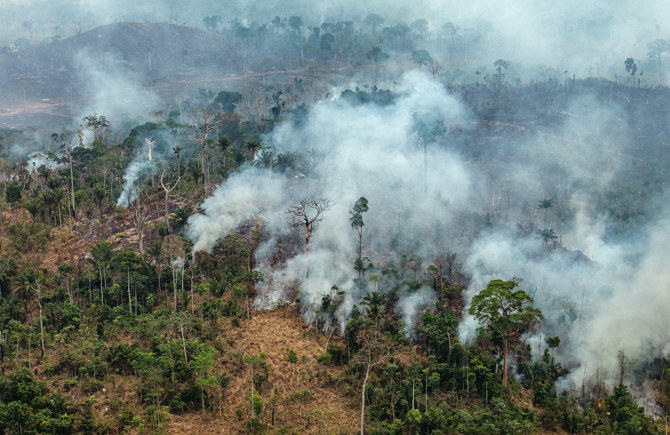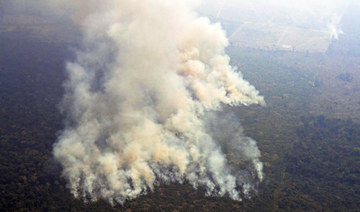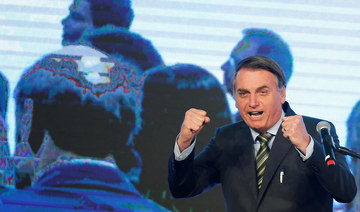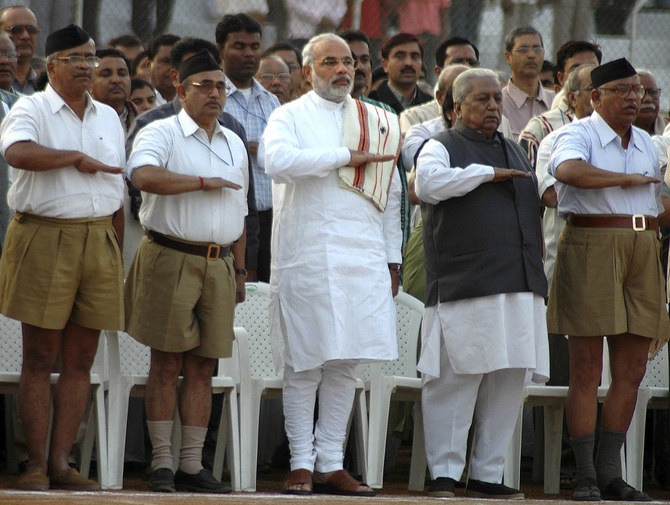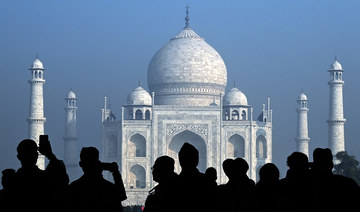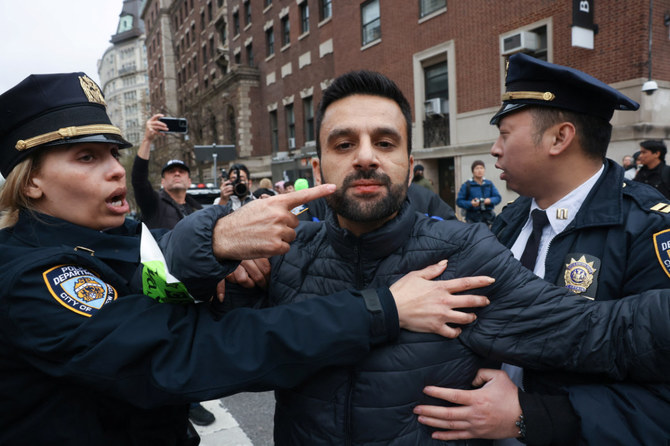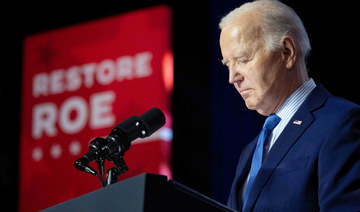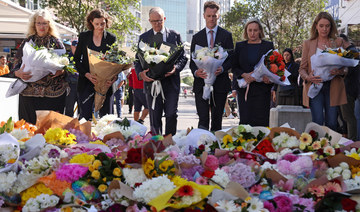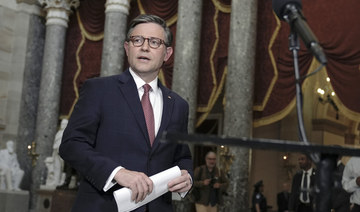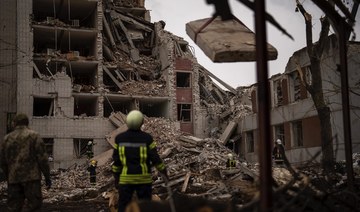ABU DHABI: As the globe’s largest tropical forest, it serves as the lungs of the planet. But the Amazon is facing its worst devastation, with intensifying fires that are scorching one of the world’s most valuable resources — and will have an environmental impact far beyond the 2.12 million square mile ecoregion.
A record number of fires have broken out in the rainforest — which produces about 20 percent of Earth’s oxygen — this year. Recent outbreaks have led to alarming, and headline-grabbing scenes of fiery flames sweeping across the Amazon and smoke blanketing the city of Sao Paulo.
It has prompted a viral campaign #PrayForTheAmazon to explode on social media, while French President Emmanuel Macron called for the “international crisis” to be at the top of the agenda at the G7 Summit in France.
Experts said the flames sweeping the Amazon — with 75,336 fires recorded this year alone, according to Brazil’s National Institute for Space Research (INPE) — have ramifications for the globe, including the Arab world.
“These are big forests: They cover about 40 percent of South America, which is equivalent to two-thirds of the area of the US, close to the total land area of Middle East and North Africa (MENA) states,” Tony Addison, chief economist and deputy director for the UN World Institute for Development Economics Research, told Arab News.
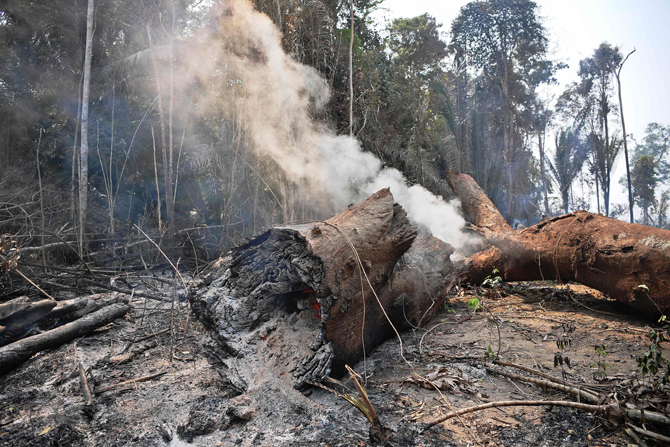
Smoke billows from the burning trunk of a tree in the surroundings of Porto Velho, Rondonia state, in the Amazon basin in west-central Brazil, on August 24, 2019. (AFP / Carl De Souza)
Addison said the Amazon — which accounts for a quarter of the carbon dioxide absorbed by the world’s forests — is integral to the planet’s ecosystem, and is on the frontline of the fight against global warming as it is a vital carbon store.
“Aside from its magnificent biodiversity, the Amazon acts as a sink for carbon dioxide, which is the main greenhouse gas causing climate change, including the rise in global temperatures,” explained Addison. “The forests remove carbon dioxide from the atmosphere, allowing the trees and plants to grow, and emit oxygen.
“The Amazon is often referred to as the lungs of the planet, perhaps providing 20 percent of the world’s oxygen. So every breath you take in the Arab world relies on it and other rainforests.”
INPE said the number of fires reported since January this year represents an 85 percent jump from the same point last year. In the last two years, the area ravaged by fire has more than doubled, from 3,168 square miles during the first seven months of 2017 to 7,192 square miles during the same period this year.
The World Wide Fund for Nature’s Amazon program pinpoints the blame on the expansion of agricultural activity, with deforestation a leading force, much of it conducted illegally. Wildfires often occur in the dry season in Brazil, but they are also deliberately started to illegally deforest land for cattle ranching for the beef business.
Brazilian President Jair Bolsonaro has faced worldwide criticism for his role in the trend. Bolsonaro campaigned on promises to open up the rainforest for development. However, this week he deployed soldiers in nature reserves, indigenous lands and border areas beset by fires.
Addison said in addition to seriously affecting the biodiversity of the area, the fires worsen the climate crisis due to carbon emissions from the burning of organic materials. The ripple effect, said Addison, will be felt globally, in particular the Arab world.
IN NUMBERS
20% - The Amazon rainforest produces about 20 percent of earth’s oxygen. The ecoregion spans about 2.12 million square miles covering Brazil, Colombia, Peru and other countries.
1/4 - The Amazon accounts for a quarter of the carbon dioxide absorbed by the world’s forests.
20% - The Amazon has lost 20 percent of its size is recent years because of deforestation.
80% - About 80 percent of the varieties of food in the world come from the Amazon.
85% - Since January, the Brazilian Amazon has suffered 75,336 fires, according to the country’s National Institute for Space Research, an 85 percent jump from the same point last year.
“The Amazon rainforest fires add to the global stock of carbon in the atmosphere and increases the risk that global temperatures rise by more than 1.5 degrees Celsius above pre-industrial levels. The 2016 Paris UN climate agreement aims to keep the temperature rise below this level, and MENA countries are signatories to this pledge,” he said. “This affects everyone, but especially the Arab countries as the target is a global average, and the temperature rise in the Middle East will be much higher than this.
“More expenditure will be required in MENA countries to adapt to climate change, including more air-conditioning, a rise in sea levels needing more investment in flood control — especially for low-lying cities — and an increased frequency of extreme climate events with serious impacts on food production.
“If the global temperature rise does exceed 1.5 degrees Celsius, then there is a high risk of the global climate system becoming completely unstable.”
Toby Gardner, a senior research fellow at the Stockholm Environment Institute and director of Trase, an organization striving for a deforestation-free economy, told Arab News that the recent fires were “extremely worrying.”
He added: “The number of fires is not as significant, it is the area that they impact, and we will only see that once the smoke has cleared. But when you can see smoke covering the atmosphere in places such as Sao Paulo, then that is very worrying.”
Gardner, who has spent the last 20 years working to highlight environmental changes in the Amazon, said the areas that have been most impacted are those that have been burnt before, where trees are regenerating and are more vulnerable.
If trends continue, Gardner said the whole ecosystem could “shift away from being a tropical rainforest to something that is unrecognizable: A rainforest made up of vastly regenerated trees. The more a forest is degraded and pushed to a tipping point the more it becomes an actual source, rather than a preventer, of carbon dioxide.”
Carlos Nobre, a climate scientist at the University of Sao Paulo’s Institute of Advanced Studies, told Arab News: “Most of the fires in the Amazon region are not on standing forests. They are set by humans on felled trees to clear huge areas for mostly cattle grazing and less to croplands. Clearcutting rates are higher this year and likely the highest of the decade.”
Nobre said tropical forests are vital carbon storage places.
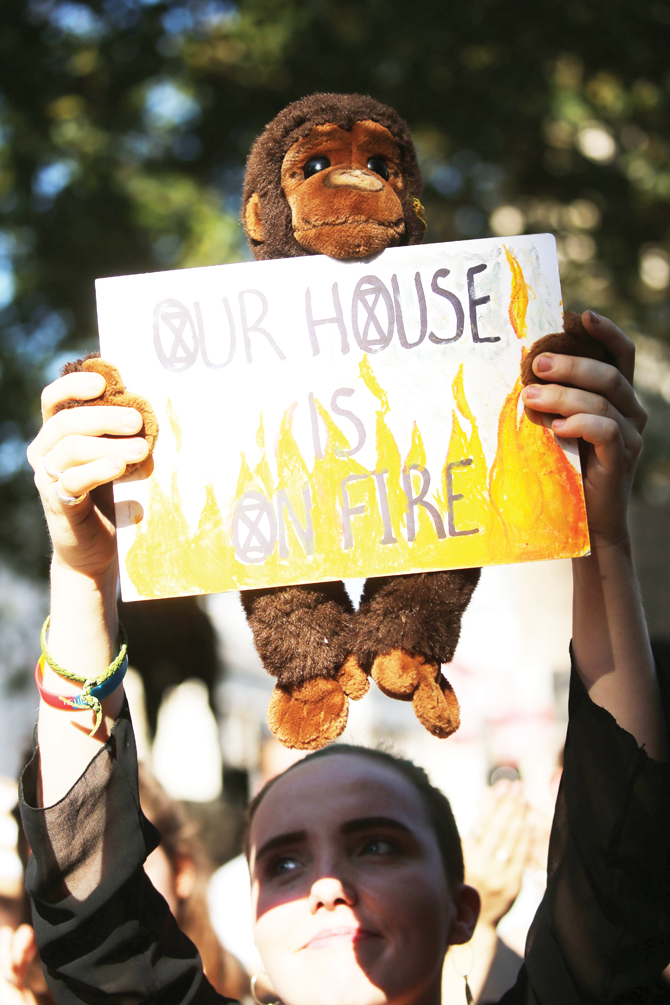
In the last two years, the area ravaged by fire has more than doubled, as climate scientists fear that climate change caused by deforestation could make the Arab world unlivable. (Isabel Infantes / AFP)
“Tropical deforestation contributes about 15 percent of emissions of greenhouse gases to global warming. The undisturbed portions of the Amazon remove up to 2 billion tons of carbon dioxide a year from the atmosphere, a critically relevant environmental service.
“Deforestation and biomass burning have global implications and accelerate global warming. The impact of global warming on the Arab world will be huge as it could soon exceed the physiological threshold for humans with temperature and humidity, particularly in cities along the coast.”
Nobre added the world “has to find a completely new development paradigm for the Amazon.
“This rainforest is an innovative bio-economy based on its immense biodiversity, the largest on Earth. At the same time, traditional agriculture must be more productive. Cattle ranching in the Amazon is the main driver of deforestation and fires. It holds less than one head of cattle per hectare.”
Fires have threatened the Amazon for years. However, the recent upsurge has prompted international outcry, with UK Prime Minister Boris Johnson, German Chancellor Angela Merkel and Macron citing it as an international crisis.
According to Greenpeace, over the last 40 years, the Brazilian Amazon lost more than 18 percent of its rainforest — an area about the size of California — to illegal logging, soy plantations and cattle ranching.
Addison said the world needs to act to save the Amazon from ecological devastation.
“(We need to) stop the fires and reverse the rise in deforestation. Brazil has been relatively successful in recent years in slowing deforestation.”
Gardner agreed: “We need a commitment and we need action, not words, to save this precious rainforest.”





